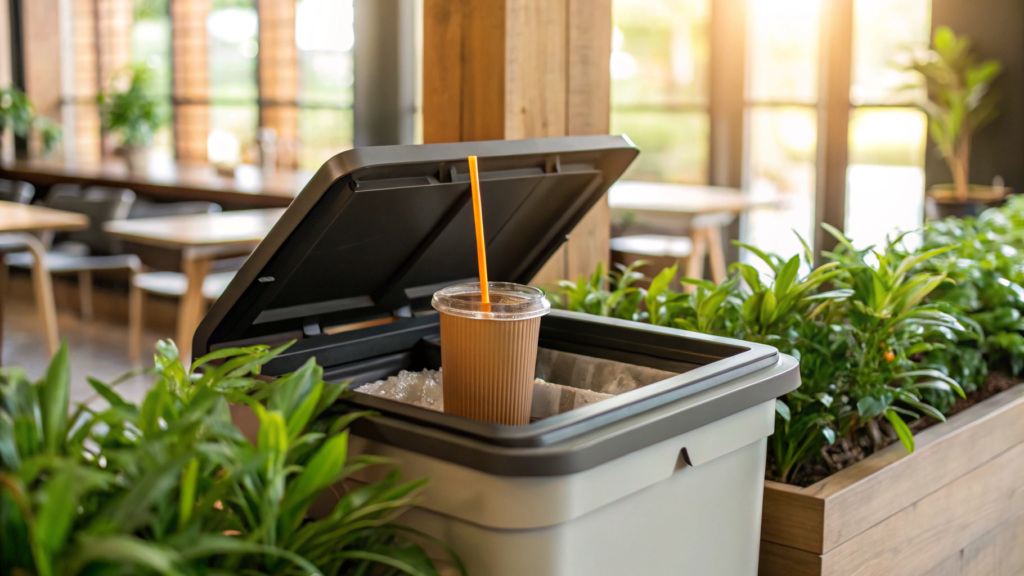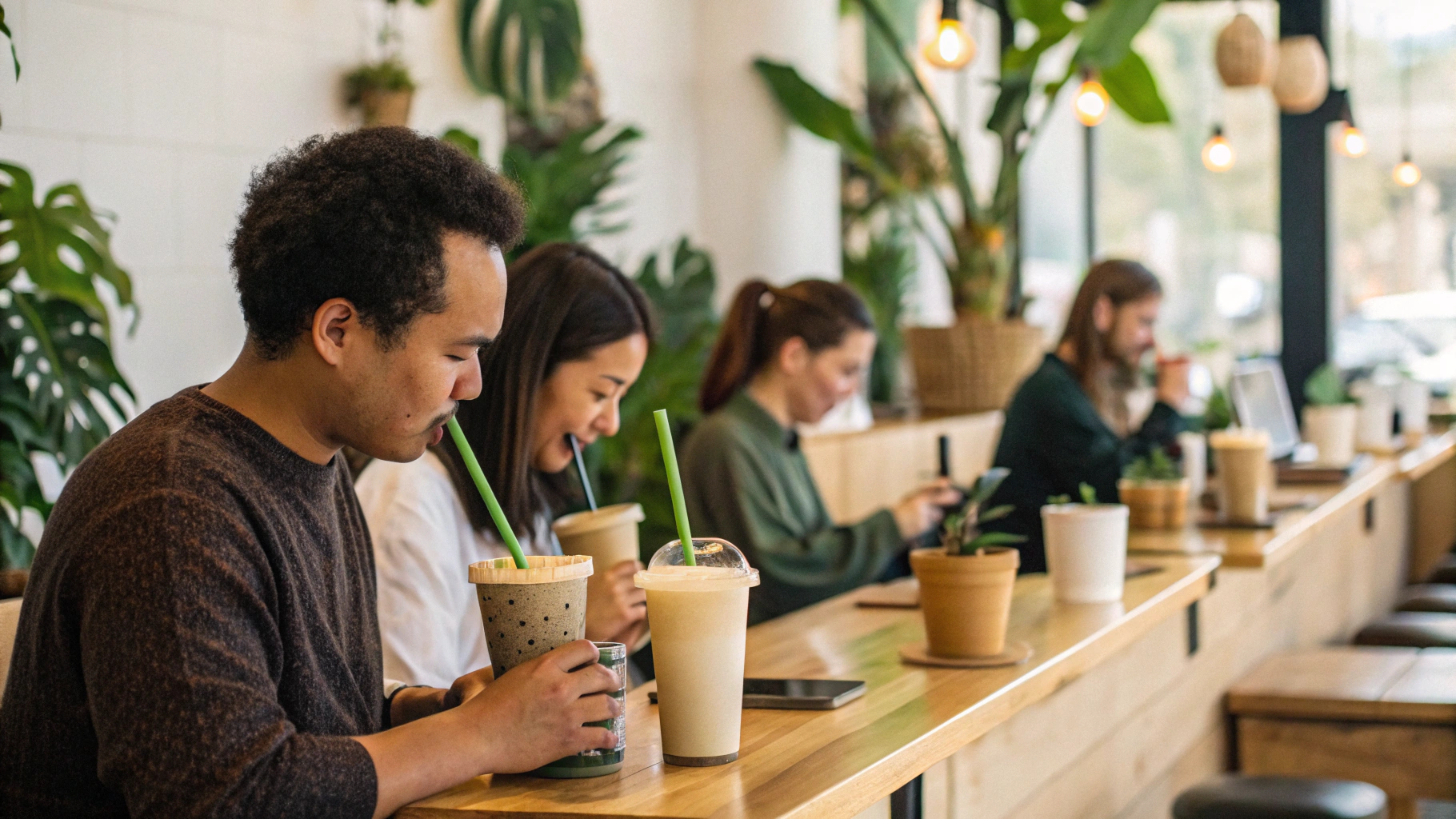Composteerbare milieuvriendelijke Boba-rietjes gebruiken in een duurzame caféomgeving
Terwijl de wereld duurzame praktijken omarmt, zijn milieuvriendelijke verpakkingsoplossingen naar voren gekomen als belangrijke spelers, vooral in de cafésector. Composteerbare milieuvriendelijke Boba-rietjes zijn een van de nieuwste innovaties om grip te krijgen. Ze spreken niet alleen een milieubewuste consumentenbasis aan, maar bieden ook een veelzijdige en praktische optie voor cafés die op zoek zijn naar duurzame alternatieven. Van merkrietjes tot opties met een grote diameter voor boba-drankjes: de overstap naar duurzame, milieuvriendelijke Boba-rietjes is een cruciale stap in het terugdringen van het wereldwijde plasticafval.
Naleving en certificeringen voor composteerbare milieuvriendelijke Boba-rietjes
Om de geloofwaardigheid en de impact op het milieu van composteerbare rietjes te garanderen, is naleving van industrienormen essentieel. Certificeringen zoals die van ASTM richtlijnen opstellen voor composteerbaarheid en materiaalveiligheid. Het voldoen aan deze normen garandeert niet alleen de kwaliteit van het product, maar verbetert ook de reputatie van een bedrijf als milieuverantwoord bedrijf.
Uit een rapport uit 2022 blijkt dat meer dan 75% van de mondiale caféketens ernaar streeft om in 2025 volledig milieuvriendelijke oplossingen te implementeren. Deze verschuiving wordt gedreven door zowel de vraag van de consument als de wettelijke eisen om het gebruik van plastic voor eenmalig gebruik terug te dringen. Voor cafés biedt deze transitie de mogelijkheid om aan de verwachtingen van de klant te voldoen en tegelijkertijd in lijn te zijn met de mondiale duurzaamheidsdoelstellingen. Een cruciaal aspect van deze naleving is het begrijpen van certificeringen zoals het Biodegradable Products Institute (BPI), dat verifieert dat producten binnen een specifiek tijdsbestek efficiënt worden afgebroken in commerciële composteringsfaciliteiten.
Deze certificeringen verzekeren bedrijven ervan dat composteerbare milieuvriendelijke Boba-rietjes een milieuvriendelijke keuze zijn, waardoor hun rol in duurzame verpakkingsoplossingen wordt versterkt.
Composteerbare milieuvriendelijke Boba-rietjes vergeleken met alternatieven
Bij het kiezen van rietjesoplossingen is het essentieel om composteerbare milieuvriendelijke Boba-rietjes te vergelijken met alternatieven zoals plastic, papier en bamboe. Hier is een korte vergelijking van hun functies:
| Functie | Composteerbare rietjes | Kunststof rietjes | Papieren rietjes | Bamboe rietjes |
|---|---|---|---|---|
| Composteerbaarheid | Ja | Nee | Vaak Ja | Ja |
| Duurzaamheid | Hoog | Hoog | Gematigd | Hoog |
| Kostenefficiëntie | Gematigd | Hoog | Laag | Gematigd |
| Milieu-impact | Laag | Hoog | Gematigd | Laag |
| Maatwerk | Hoog | Laag | Gematigd | Gematigd |
In 2023 bleek uit een sectoranalyse dat, hoewel plastic rietjes op voorhand het minst duur zijn, de milieukosten op de lange termijn ertoe hebben geleid dat veel cafés zijn overgestapt op milieuvriendelijke alternatieven. Bedrijven die op zoek zijn naar een evenwicht tussen kostenefficiëntie en ecologische verantwoordelijkheid kunnen onze uitgebreide gids voor composteerbare milieuvriendelijke Boba-rietjes raadplegen voor aanvullende inzichten.
Zakelijke voordelen van composteerbare milieuvriendelijke Boba-rietjes
Het gebruik van composteerbare milieuvriendelijke Boba-rietjes brengt tal van zakelijke voordelen met zich mee die verder gaan dan hun milieuvriendelijke karakter. Ten eerste vergroten ze de verkoopbaarheid van een café, vooral onder consumenten die duurzaamheid voorop stellen. Uit een onderzoek uit 2022 bleek dat 68% van de ondervraagde caféklanten de voorkeur gaf aan gelegenheden die het plasticgebruik actief terugdringen.
Bovendien bieden composteerbare rietjes veelzijdigheid, met opties die verkrijgbaar zijn in verschillende maten, waaronder rietjes met een grote diameter, ideaal voor boba-drankjes. Veel leveranciers bieden ook maatwerkmogelijkheden, waardoor cafés hun merkidentiteit kunnen versterken en tegelijkertijd duurzaamheid kunnen bevorderen.
Vanuit financieel perspectief kunnen de initiële kosten hoger zijn dan die van traditionele plastic rietjes, maar de voordelen op de lange termijn (waaronder merkloyaliteit en het aantrekken van klanten) kunnen leiden tot hogere inkomsten. Bovendien blijkt uit onderzoek dat bedrijven die groene praktijken toepassen, een grotere medewerkerstevredenheid zien, wat bijdraagt aan een betere service en operationele efficiëntie.
Milieu-impact van composteerbare, milieuvriendelijke Boba-rietjes
De milieu-impact van composteerbare milieuvriendelijke Boba-rietjes is aanzienlijk. Deze rietjes ontbinden binnen 180 dagen in een commerciële composteerinstallatie, waardoor de hoeveelheid afval die anders zou bijdragen aan stortplaatsproblemen aanzienlijk wordt verminderd. Volgens ecologische gegevens uit 2023 zou de overgang van plastic naar composteerbare rietjes kunnen voorkomen dat jaarlijks ongeveer 300 miljoen plastic rietjes in het mariene milieu terechtkomen.
Bovendien helpt de keuze voor composteerbare oplossingen cafés om deel te nemen aan een circulaire economie, waardoor een verantwoord beheer van de levenscyclus van hulpbronnen wordt bevorderd. Door plastic te vervangen door composteerbare materialen dragen bedrijven bij aan het verminderen van de uitstoot van broeikasgassen die gepaard gaat met de productie en afbraak van plastic. Dit sluit perfect aan bij de mondiale duurzaamheidsdoelstellingen om de consumptie van plastic voor eenmalig gebruik tegen 2030 met 50% te verminderen.
Voorbeeld uit de praktijk: composteerbare, milieuvriendelijke Boba-rietjes in actie
Neem het geval van Café Verde, een kleine maar wereldwijd erkende keten van duurzame cafés, die begin 2023 de overstap maakte naar composteerbare milieuvriendelijke Boba-rietjes. Binnen zes maanden rapporteerden ze een toename van 20% in het klantbezoek van milieubewuste consumenten. Hun transitie resulteerde ook in een verlaging van de afvalbeheerkosten met 30%, dankzij het gebruik van gecertificeerde composteerbare materialen. Deze beslissing sloot aan bij de missie van Café Verde om hun ecologische voetafdruk tegen 2025 met 40% te verminderen.
De succesvolle integratie van deze rietjes was voornamelijk te danken aan effectieve partnerschappen met leveranciers en strategieën voor klantbetrokkenheid, waaronder educatieve campagnes over de voordelen voor het milieu en de juiste verwijderingsmethoden voor composteerbare rietjes. Het verhaal van Café Verde illustreert de tastbare voordelen die composteerbare oplossingen kunnen opleveren voor bedrijven die zich richten op duurzaamheid.
Veel Gestelde Vragen
Vraag: Wat maakt een rietje composteerbaar?
A: Composteerbare rietjes zijn gemaakt van materialen die in een composteerinstallatie uiteenvallen in niet-giftige componenten. Ze moeten voldoen aan specifieke normen, zoals ASTM D6400.
Vraag: Hoe komen deze rietjes economisch ten goede aan cafés?
A: Hoewel composteerbare rietjes in eerste instantie duurder zijn dan plastic, kunnen ze milieubewuste klanten aantrekken, waardoor de omzet mogelijk toeneemt en de kosten voor afvalbeheer op de lange termijn worden verlaagd.
Vraag: Zijn composteerbare rietjes duurzaam genoeg voor bobadrankjes?
A: Ja, de meeste composteerbare rietjes zijn ontworpen om de viscositeit van boba-drankjes en de temperatuur van dranken aan te kunnen, zodat ze altijd duurzaam blijven.
Vraag: Kunnen composteerbare rietjes worden aangepast voor branding?
A: Absoluut! Veel bedrijven bieden logo-afdrukken en verschillende formaten aan, waardoor ze perfect zijn voor cafés en retailers die hun merk willen promoten en tegelijkertijd duurzaam willen blijven.
Vraag: Hoe verhouden composteerbare rietjes zich tot bamboe-alternatieven?
A: Composteerbare rietjes bieden doorgaans meer aanpassingsmogelijkheden en zijn ontworpen voor efficiënte afbraak in compostfaciliteiten, terwijl bamboe duurzaam is maar mogelijk geen aanpassingsflexibiliteit heeft.
Vraag: Hoe zit het met de trends in de consumentenvraag naar deze rietjes?
A: De vraag naar composteerbare opties is enorm gestegen, waarbij uit onderzoek blijkt dat 55% van de consumenten de voorkeur geeft aan cafés met duurzame praktijken.
Vraag: Zijn er certificeringen vereist?
A: Ja, certificeringen zoals het Biodegradable Products Institute (BPI) verifiëren de composteerbaarheid van deze rietjes en zorgen ervoor dat ze voldoen aan de milieunormen.







